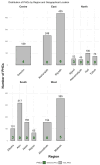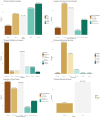Exploring electronic health record systems implementation in primary health care centres in Saudi Arabia: pre-post implementation
- PMID: 40589969
- PMCID: PMC12206798
- DOI: 10.3389/fmed.2025.1502184
Exploring electronic health record systems implementation in primary health care centres in Saudi Arabia: pre-post implementation
Abstract
Background: The Saudi government has allocated four billion Saudi Riyals (approximately $1,066 million) to establish the National Electronic Health Record (NEHR) and advance its e-health strategy. Over seventy projects have been identified to achieve this vision. Following the failure of previous initiatives, the Ministry of Health (MoH) in Saudi Arabia is prioritizing the implementation of Electronic Health Record Systems (EHRS) in all Primary Healthcare Centres (PHCs). This study evaluates the implementation of EHRS in PHCs at two phases: pre-implementation and post-implementation.
Methods: A quantitative, self-reported questionnaire was employed at two distinct timescales (pre- and post-implementation) to assess user attitudes and experiences. The study population included all clinical and administrative staff working in Saudi PHCs (n = 38,514). A multi-stage cluster sampling technique was used, resulting in data from total 834 participants in both pre and post implementation phases.
Results: Participants demonstrated a high level of awareness regarding the perceived usefulness of EHRS during the pre-implementation phase. In the post-implementation phase, agreement toward EHRS usefulness increased, with 96.6% of participants endorsing the system's implementation. However, dissatisfaction emerged regarding training and technical support mechanisms. Negative attitudes were also expressed, particularly regarding the time required to assist less experienced users. Variability in user attitudes was observed across scales measuring perceived usefulness, training and support, and negative attitudes. These findings highlight evolving perceptions influenced by direct system use and organizational support.
Conclusion: End-user attitudes toward EHRS implementation vary over time and are influenced by system usability, organizational support, and the scale of the project. Addressing training deficiencies, improving technical support, and involving end-users in the implementation process are critical to fostering positive attitudes and ensuring successful EHRS adoption in PHCs.
Keywords: IT project management; Questionnaire; Saudi Arabia; electronic health records; large-scale project; primary healthcare centers; user attitude.
Copyright © 2025 Alzghaibi and Hutchings.
Conflict of interest statement
The authors declare that the research was conducted in the absence of any commercial financial relationships that could be construed as a potential conflict of interest.
Figures
References
-
- Amponin AM, Britiller MC. Electronic health records (EHRs): effectiveness to health care outcomes and challenges of health practitioners in Saudi Arabia. Saudi J Nursing Health Care. (2023) 6:123–35. doi: 10.36348/sjnhc.2023.v06i04.002 - DOI
LinkOut - more resources
Full Text Sources





